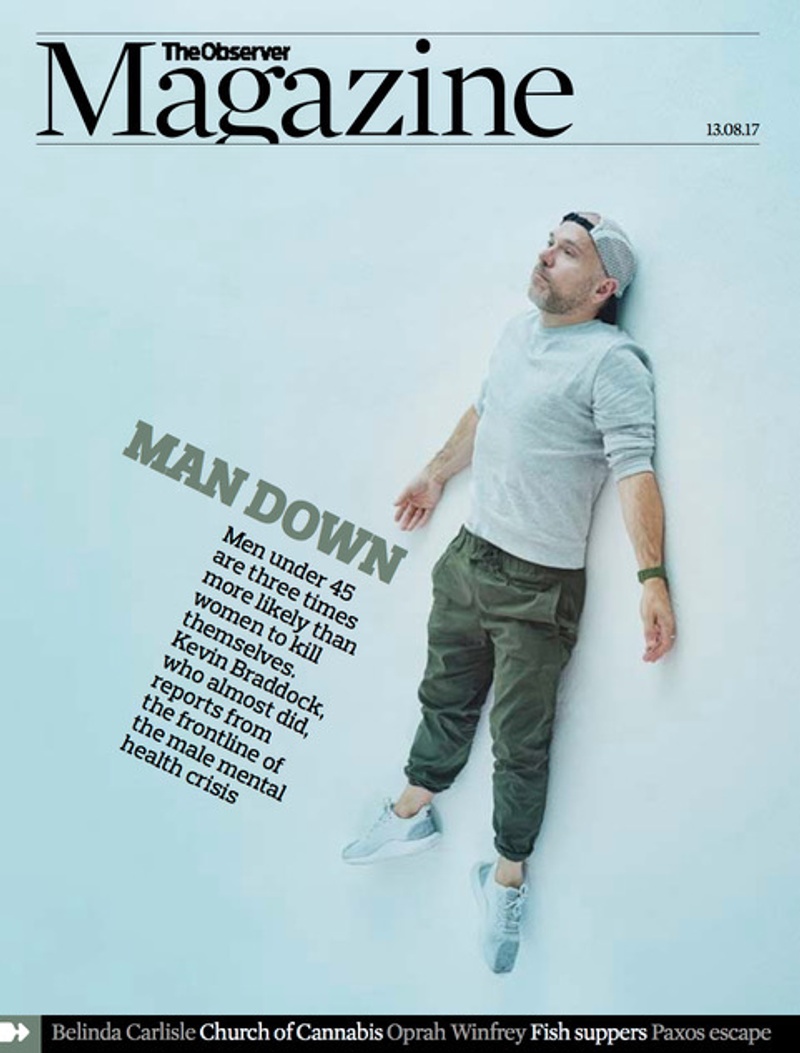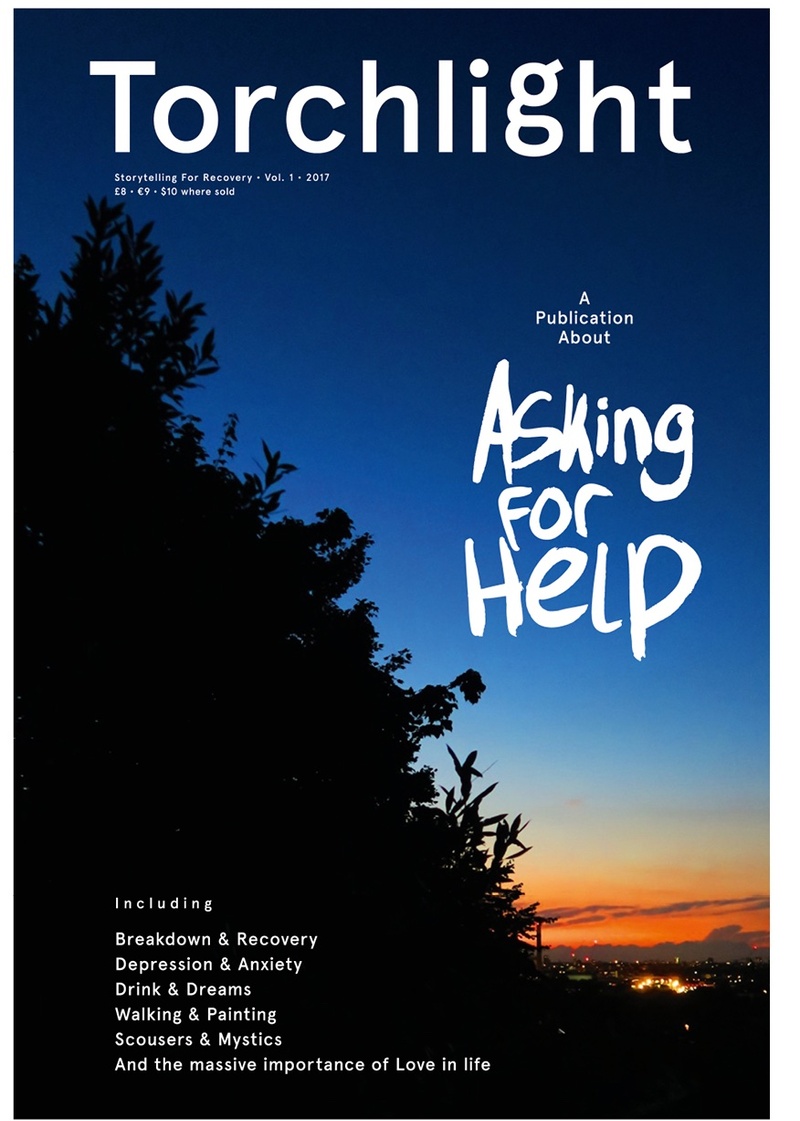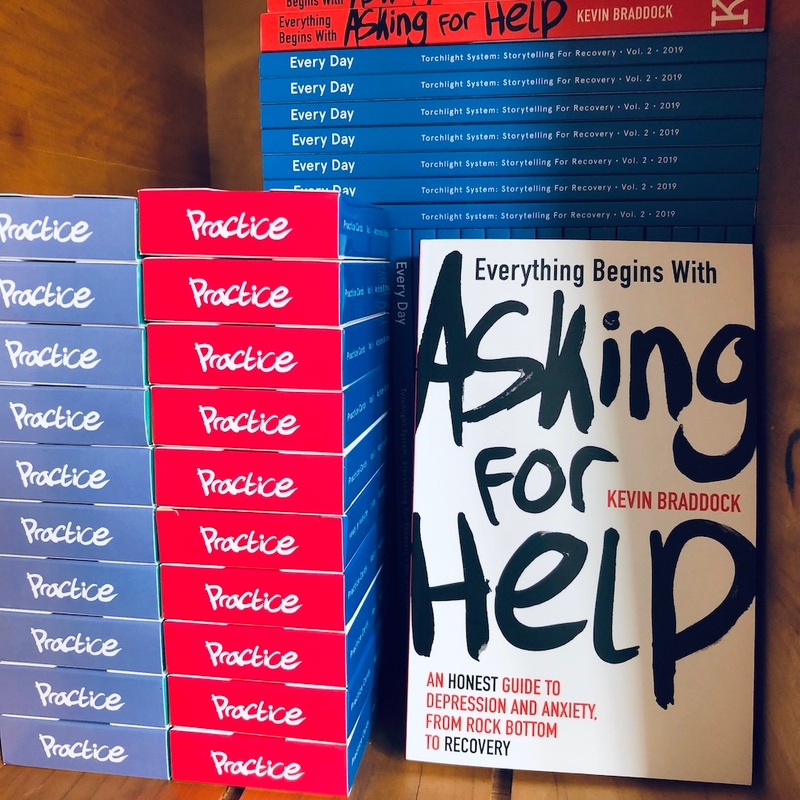What is it that you do?
I’m a writer and also a psychotherapist. My background is in journalism, media, magazine journalism. I used to write for lots of style magazines, like The Face, GQ, Esquire, and Men’s Health. I studied French at university but recently changed the direction of my career towards a focus on what’s commonly called “mental health.”
You published your own magazine in the past called Torchlight. Do you want to tell me about that publication?
Torchlight was DIY. I thought of it like a magazine, but it’s really a book. It’s a book with images in it. It’s a book I made describing an experience of depression, of what’s technically called a major depressive episode, which is what happened to me in 2014. I then went through a process of recovery, and I wanted to write it down as a way to understand it for myself, in order to talk about it, make an object out of it in the spirit of blazing honesty to say, “Okay. Right. This is the part of my life that you probably don’t know about.” So that came out in 2017. I was very surprised by the reaction to it. I printed 350 copies. I just wanted to give it to people, and what happened then was a friend of mine saw it, and she works for The Observer newspaper in the UK. She said, “Would you like to write the story, kind of condense the story about the issue of men, depression, and suicide?” Said, “Yeah.” Then it was a cover story, and it went viral.
As a result, I got a deal from another publisher to write a paperback, a slightly more, what’s the word, orthodox book about depression. So this book was called Everything Begins with Asking for Help: An honest guide to depression and anxiety, from rock bottom to recovery. It’s a combination of memoir and practical book that says, “Look, if you’re struggling, here’s a whole load of things that you can do to assist your recovery, to assist your mental health, to assist your dealing with mental illness, specifically depression and anxiety.” That came out in 2019, and it sold pretty well.
Since then, I’ve retrained as a psychodynamic psychotherapist. There are lots of different types of psychotherapy, but psychodynamic is a version of psychoanalysis, which is the oldest form of psychotherapy. It’s based on the writings of people like Freud, Jung, Klein, and Lacan.
Creativity obviously played a big role in you getting better because you put your breakdown on paper.
I think of myself as a writer or an author, more and more as an author actually, and I think that the idea of an author is… I looked at the etymology of “author” the other day. It comes from the Latin, to act. It’s about making something. Having always been a writer, I’d always been writing about a subject, like music. I was a music writer for a long time and interviewed people like Daft Punk, and Underworld, and all the big dance music acts and then I wrote about fashion and lifestyle trends. So I’ve always written about objective subjects or objective things and not about me. I’d never really done any creative writing, personal reflective writing, which is I think what it is. Then after this breakdown happened…What happened was I put a message on Facebook saying, “I need help,” and people came to help me, and took me to a crisis center. I began to get better, and it was a real mess for quite a long time. Still am in many ways.
The real turn was I had a friend called Sean, a guy that I hadn’t seen for a long time. After I’d been taken to hospital, friends were coming over to check in on me in my flat in Berlin. Sean was checking in on me every day and one day he just said to me, “Look, Kev. From now on, what you need to do is be completely honest and open about this stuff, this illness.” I think it is an illness, depression, rather than a symptom. He said, “Look, seeing as you’re a writer, why don’t you write about it?” I’d never thought about it before, and I thought, “That’s quite a good idea.” He was very insistent about this idea. I asked, “Why do you feel so strongly about this, Sean?” He said, “Well, it’s very simple.” He says, “My sister had what you’re going through, and she killed herself. She didn’t make it.” So I thought, “Okay, I better do what he suggests.”
Writing this Torchlight thing was a process of piecing together everything that happened in the run-up to this moment and then everything that happened after it for a certain length of time until I felt like, “Okay, I’m well enough to present this.” I mean, the thing with stories is that they never really end. You just have to choose a moment to go, “Okay, it’s today. End of story.”
How does your experience of psychotherapy tie in with writing?
I think that having spent a long time in psychotherapy personally, I think that the dialogic process, two people talking, enables the client, or i.e. me in that case, to arrive at some form of personal truth that can’t really be got to alone. I mean, one of the criticisms of psychotherapy is it’s just talking, but it’s about making meaning. It’s about shared meaning. I think that speaking psychotherapy and writing are effectively the same thing, the process of authorship. I think they’re very, very similar. They work in the same function.
And all the best stuff in the world happens in collaboration. Usually, the best things, I think, happen in life when they come out of nowhere instead of… What do I mean by that? I mean, that often the best things happen when something just appears, and you’re just like, “Okay, that sounds like a good idea. I’ll do that.”
The rest of it, for me, was just about work, just having the self-discipline to sit there, and write it down, and be frustrated but in the end, in my opinion, it’s a lovely process.
Can you describe your process of writing Torchlight or the book?
It’s the same in psychotherapy. You never know what you’re going to say, but someone has to be present to hear it and to repeat it back to you. I’m not thinking the thoughts before speaking them. They’re just coming out. It’s more of a pure transfer.
What I’ve understood or learned and generally believe in the psychotherapy I’ve done and now practice is that we have an unconscious, and it’s part of the mind that is locked away, but speaking is one way that it appears, as in dreams. Actually, Torchlight, the word, came from dream that I had. So it’s quite psychoanalytic or psychodynamic in that sense.
When I first started writing, I thought, “I just want this to be as raw as possible,” because that’s what it was like going through a breakdown. You know this yourself, but there’s just psychic material pouring out of you like fear, and anger, and anxiety, and misery. It’s just pouring out of you. It’s not yet in a verbal state.
Writing can be very reflective. You write something. Then you re-edit. I just wanted it to be pure output, mad, psychotic speech. The surrealists had this idea called automatic writing where they would just write. The surrealists were really interested in the unconscious. That’s the idea of automatic writing – trying to make the unconscious automatic instead of what we do, which is mediated through the ego. The ego is the editing device, and the unconscious is where, I think, the real raw material is.
Do you think when you were writing Torchlight that you were able to access the unconscious and that was what was coming out?
Yeah, to a degree. I mean, I think by the time Torchlight turned into the paperback, I’d written that story once already and then wrote another version of it, which was slightly less raw and more reflective because you don’t want to scare your readers.
I mean, this is one of the things. There are lots of books about depression and mental illness, and they all basically say same thing, which is that I went through something terrible, but I somehow got through it. I’m better now, and this is what helps. Torchlight had these word paintings I started making just a couple of days after I got taken to a crisis center. I painted words that seemed significant to me with a fat brush. I felt it was unconscious material encapsulated in one word. “Breakdown,” for instance. I was just scribbling these words down, pinning them up on the wall to tell myself this is what happened because I needed something outside of me because my inside was completely disintegrated. I felt as though I’d just shattered, and there was no continuity in myself. That’s happened a few times in my life. And so I think that these word paintings, I used some of them in Torchlight, and I think they’re closer to what I’m talking about, about representing something that began in the unconscious.
I mean, having done this master’s in psychodynamic psychotherapy, the more and more I think that creativity’s a very misunderstood word. I think people tend to think it’s like art, and writing, and painting, but I just think that people are living in a creative way every day. Picasso said, “All children are artists, and the challenge is to remain one after becoming an adult.” Where does that creativity spring from? I think it usually comes from some tension, some conflict within one’s self. The old question is do you need to be in pain to be an artist. I don’t know but I know difficult times have made me create.
People can be creative in all sorts of ways. I don’t think it needs to be works of art. I think creativity is fundamentally an act of engaging with yourself… I mean, this is the thing with psychotherapy, it’s permitting yourself to engage with yourself and overcoming the sort of perceived accusation that it’s a sort of narcissistic thing to do.
I think politically, we’re in era of complete powerlessness, and so the radical thing to do is to go, “Okay. Well, what can I work with? I remember a guy saying… I mean, I think again this is like what the Buddha was saying, “Work on yourself.” In simple terms, “Be the change you want to see, but begin with yourself.” I think seeing yourself and your life as a creative process rather than a fixed entity… It’s certainly been the case in my life. The moment I think, “Okay. That’s it. I’m arrived. I’m here now,” then that’s the moment it all changes again, and disruption happens.
Kevin Braddock Recommends:
Read Animal Joy by Nuar Alsadir, who is a poet and psychoanalyst. A beautiful book about being human
For help with mental health: use the body, move it every day, do exercise. I really enjoy running and practicing Tai Chi
Deptford High Street in London
Spaghetti alla Puttanesca. Really simple to make and cheap too
Ask for help
This post was originally published on The Creative Independent.


